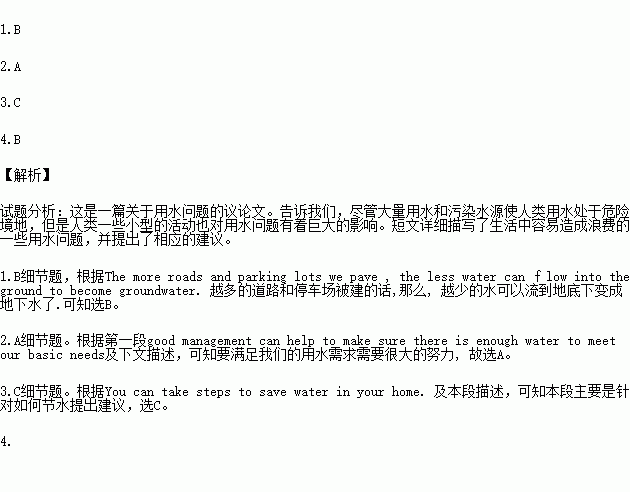题目内容
Using too much water or throwing rubbish into our rivers are clear ways that humans can put our water supply in danger, but we also affect our water supply in less obvious ways. You may wonder how paving (铺砌) a road can lead to less useable fresh water. A major part of the water we use every day is groundwater. Groundwater does not come from lakes or rivers. It comes from underground. The more roads and parking lots we pave, the less water can flow into the ground to become groundwater.
Human activity is not responsible for all water shortages (短缺).Drier climates are of course more likely to have droughts (干旱) than areas with more rainfall, but in any case, good management can help to make sure there is enough water to meet our basic needs.
Thinking about the way we use water every day can make a big difference, too. In the United States, a family of four can use 1.5 tons of water a day! This shows how much we depend on water to live, but there's a lot we can do to lower the number.
You can take steps to save water in your home. To start with, use the same glass for your drinking water all day. Wash it only once a day. Run your dishwasher (洗碗机) only when it is full. Help your parents fix any leaks in your home. You can even help to keep our water supply clean by recycling batteries instead of throwing them away.
1.Which of the following is most likely to lead to less groundwater?
A. Using river water.
B. Paving parking lots.
C. Throwing batteries away.
D. Throwing rubbish into lakes.
2.What can be inferred from the text?
A.It takes a lot of effort to meet our water needs.
B.All water shortages are due to human behavior.
C.There is much we can do to reduce family size.
D.The average family in America makes proper use of water.
3.The last paragraph is intended to ________.
A. show us how to fix leaks at home
B. tell us how to run a dishwasher
C. suggest what we do to save water at home
D. prove what drinking glass is best for us
4.The text is mainly about ________.
A. why paving roads reduces our water
B. how human activity affects our water supply
C. why droughts occur more in dry climates
D. how much we depend on water to live

